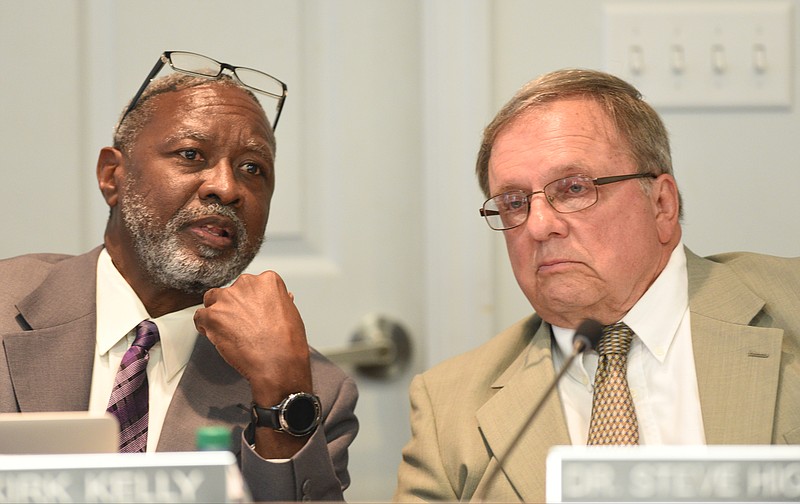The Hamilton County Board of Education has tried the all-in-one way of presenting its budget to the Hamilton County Commission. Now it will try the cafeteria strategy.
On Thursday, the school board voted 5-4 not to present the commission a budget for 2017-2018 with $33.5 million in extra funding it says it needs, but instead voted to offer the body a balanced budget accompanied by a prioritized list of those needs. In other words, instead of telling the commission to fund all its needs, it plans to ask the commission to select cafeteria-style among the district's needs it might be willing to fund.
It may or may not be any more effective than asking for the whole enchilada, but it's probably the most expedient thing the board could do.
Board member Joe Smith, in suggesting the body table the motion to present the commission with the $33.5 million in extra funding, said county commissioners need to see the board can manage the money it gets - being stingy with spending but "always advocating" for student needs. They need "to know we know how to balance a budget," he said, and the board should "show respect" in giving them one.
That may be especially true in light of several comments made in support of the extra-funds budget at the meeting.
Hamilton County Education Association President Dan Liner referred to the extra funds as "peanuts" compared to the totality of the county budget, Howard School principal Chris Earl said the Hamilton County Principals Association recently met to discuss three items that might be cut from the budget and came up with "nothing, nothing and nothing," and board member Karitsa Jones said the lack of funding was causing a "lost generation" to be "dying in the streets."
The problem is that both sides in the high-stakes game hold high cards, but the county commission will always hold the aces because it is the funding body. The school board can offer up a more than $200 million maintenance backlog, its willingness to spend down its reserve funds, its crumbling school buildings and its list of needs it says the schools must have in order to improve and thrive. But the county can show spending on schools that increases every year from state funding and tax revenue, numbers that show the county gets more funding per pupil than only a handful of counties in the state (through the Basic Education Program funding formula), and pleas from citizens not to raises taxes.
"It's a broken system," board member Dr. David Testerman said, repeating words he uses almost every meeting. When the budget process is complete, county commission members "are the heroes" for not raising taxes," he said, and "we are the villains" for asking for extra money.
If board members' understanding is correct, they may not get any this year, either. Smith said he had talked to every commissioner, and none would commit to raising property taxes. Board chairman Steve Highlander said he'd talked to a majority of commissioners and got the same response.
Yet, most board members indicated county commissioners are well aware of the schools' funding needs and are in many ways sympathetic. But they are answerable to the members of the public and, as Smith said, "I think they (the public) need more convincing."
Board member Joe Wingate said even though the board has shown more "collaboration and teamwork with the county commission" than in years past, it is incumbent upon the district "to show itself a good system" that has the ability "to take care of our house."
That puts the ball squarely in Hamilton County Mayor Jim Coppinger's court. He'll receive the school board's budget and priority list, assuming it's approved next week; discuss it with commissioners and school district leaders May 9; and then submit the countywide budget several weeks later.
As opposed to the funding being "peanuts," the mayor told the Times Free Press public education is the county's top priority and receives more funding than any other part of county government.
It's true that property taxes haven't been increased for schools in 12 years, and it's equally true that year over year funds for the school district have never not increased. If no more money will be forthcoming, the district's priority list for spending extra funds is moot. If Coppinger, and county commissioners in turn, grant the system more funds, we believe a priority list can be of help. We believe the board's decision in tabling the extra-funds budget and presenting one that is balanced, at least in this case, was the right move.
